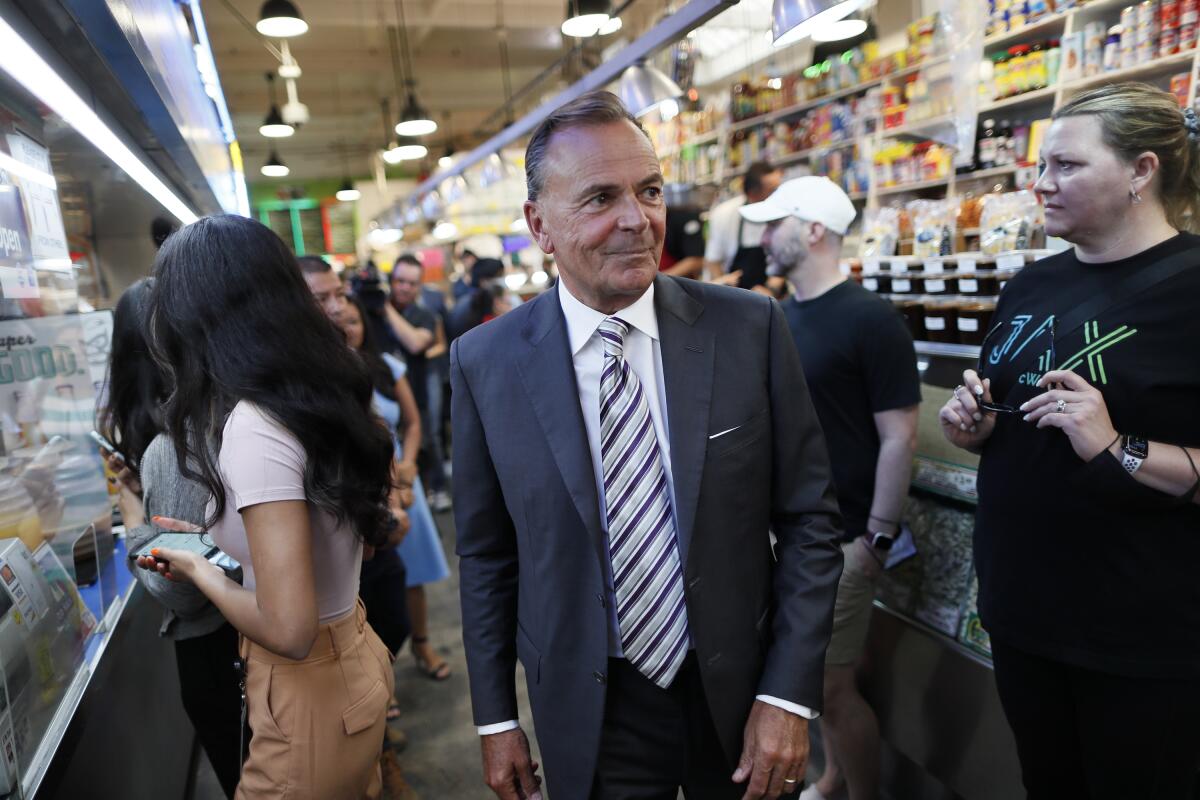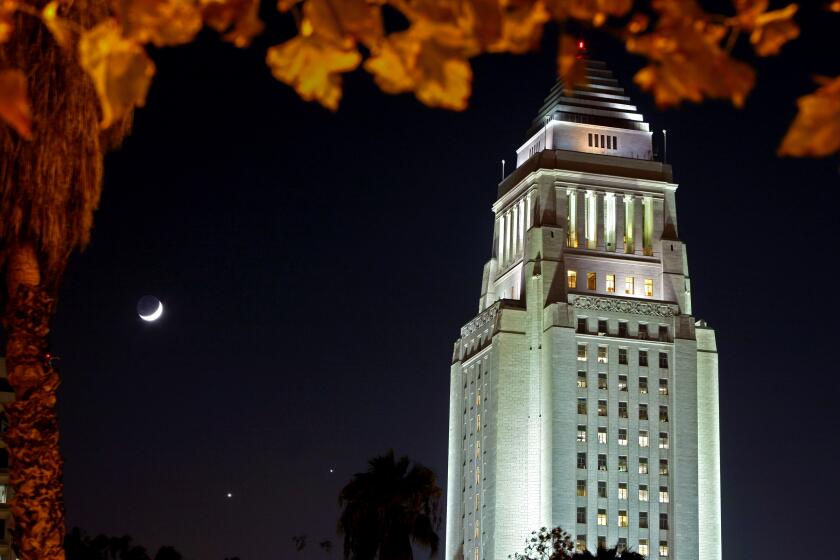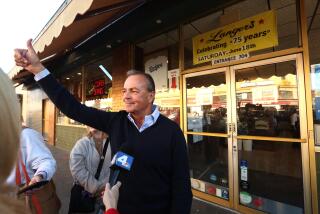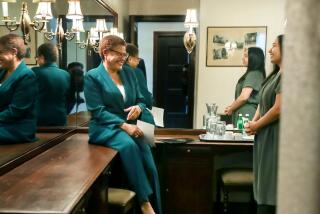With unprecedented spending, Caruso is everywhere. Can the billionaire become overexposed?

- Share via
As an information technology engineer and digital native, Tim Hamner Jr. spends a lot of time online, consuming videos, podcasts and news.
But when the 28-year-old clicked on a cooking video the other day, he first got a pitch from an increasingly ubiquitous interloper — Los Angeles mayoral candidate Rick Caruso.
For the record:
10:21 a.m. June 7, 2022An earlier version of this article said the only candidate who has spent more than Rick Caruso in this election season is running for U.S. Senate in Illinois. The candidate is running for governor.
“All I wanna do is see how to make homemade funnel cakes,” Hamner protested on Twitter, “and I gotta see a Rick Caruso ad every 5 minutes! I’m tired!!!!”
Hamner is not the only one with Caruso on the brain. The billionaire real estate developer is frustrating his opponents and delighting his friends with a surge of spending unprecedented in Los Angeles political history and remarkable even by national standards.
Caruso’s nearly $34-million outlay as of last week was more than 11 times the expenditures by his principal rival, U.S. Rep. Karen Bass. The candidate’s $24-million investment in television, radio and digital advertising more than tripled what Eric Adams spent in all of 2021 to become mayor of New York. Only one candidate in the nation — running for governor in Illinois — has spent more this election season.
And the businessman who vows to “clean up L.A.” is probably only getting started, as Tuesday’s primary vote is expected to send him and Bass into a Nov. 8 runoff election, since neither candidate is expected to reach the 50%-plus-one-vote threshold needed to avoid a second round.
“He’s running [ads] at saturation levels, which is not a bad word in our business,” said Mike Murphy, a onetime Caruso consultant and co-director of the USC Dornsife Center for the Political Future. “He’s definitely written a big enough check to be able to hit every corner of the electorate. They’re not being shy.”
Caruso has changed his party registration four times in the last 11 years.
Self-funded campaigns by the uber-wealthy have been a reality of American politics since a 1976 Supreme Court decision forbade limits on campaign spending. But Murphy and other experts in contemporary electoral politics said it is advertising content, rather than volume, that determines whether a candidate succeeds.
“The real question is not, ‘Can you be overexposed?’ ” said Bill Carrick, a veteran Democratic consultant who helped Eric Garcetti become mayor in 2013. “The real question is, ‘What are you saying in the media and is that connecting with people?’ ”
Caruso had a substantial hill to climb when he entered the mayor’s race in February, not long before the filing deadline. Though he had built and operated some of Southern California’s most popular shopping malls — including Glendale’s Americana at Brand and the Grove in L.A.’s Fairfax district — the 63-year-old was far from a household name.
Not long after he became a candidate, nearly two-thirds of voters in a poll said they did not know enough about Caruso to form an opinion of him. Of those who shared a view, 15% had a favorable impression and 21% had an unfavorable impression, according to the poll by the UC Berkeley Institute of Governmental Studies, co-sponsored by The Times.
More on the mayoral race
Though he was the first choice of just 8% of Angelenos at the outset, that meant he trailed only Bass, whose support from nearly one-third of voters gave her a substantial early lead in the race.
Then came the ads. They came in waves, via text, email, television, radio, the internet and the U.S. Postal Service. They came in English, Spanish, Chinese, Korean, Tagalog and Armenian.
In his first videos, Caruso spoke directly into the camera, looking casual in a pullover sweater and telling Angelenos that their city was in “a state of emergency” and that he could help clean up homelessness, City Hall corruption and crime that he called “out of control.”
Black-and-white family photos anchored the candidate’s biographical pitch, which introduced him as the grandson of immigrants and a believer in the American dream. Those ads also suggested that his wealth, estimated at $4.3 billion by Forbes, would allow him to act independently. “I’ll work for a dollar a year,” Caruso said. “I won’t take a dime from corporations or lobbyists.”
His ads laid out plans that include the hiring of 1,500 additional police officers and 500 more sanitation workers, additions that would put a substantial strain on an already challenged city budget. Caruso has said in interviews that he will find the money for those massive new costs by cutting waste in other city operations, a claim greeted skeptically by some veterans of City Hall’s budget wars.
Later ads have included a bevy of endorsers, ranging from community activists such as Marc Maye and “Sweet Alice” Harris of Watts to celebrity allies including Gwyneth Paltrow, Snoop Dogg and Wolfgang Puck.
Caruso has skipped several debates and forums with the other candidates, but has so far paid no obvious price for his absence. And even when he wasn’t on a debate stage, Caruso has managed to be a presence.
Polls show there are three leading contenders in the race to succeed Eric Garcetti as mayor of Los Angeles. Here’s a guide to the top contenders.
He declined an invitation to a forum on homelessness on May 20, leaving the stage to Bass, City Councilman Kevin de León and left-wing activist Gina Viola. But Caruso’s campaign paid to run banner advertising, which appeared over the top of the streaming video of the debate on The Times’ website. That meant that, as the debating candidates discussed priorities for the unhoused, Caruso’s smiling face loomed above them, with the messages “Caruso Can Clean up L.A.” and “Vote for Rick.”
While some have expressed fatigue with the Caruso ad deluge, others welcome the messages.
“I think the ads strike at the truth. He doesn’t pull back on identifying the problems, and he doesn’t hold back on talking about how he plans to address them,” said Dr. Houman David Hemmati, a physician and biotech entrepreneur. “His spending advantage would be useless if he didn’t put forth good ideas.”
Self-financed magnates have both flopped and flourished in runs for elected office.
Former EBay Chief Executive Meg Whitman lost badly despite spending $177 million, nearly five times as much as Jerry Brown, in the 2010 California governor’s race. Novice politician Michael Bloomberg spent almost $69 million of his own money to win the mayor’s office in New York City in 2001. At the time that was the most expensive campaign, below the level of president, in American history.
While Bloomberg faced familiar complaints that he had “bought” the election, some New Yorkers felt that his personal wealth insulated him from the corrupting influence of outside campaign contributors.
“I heard many, many, many voters say, ‘He is beholden to no one. I like that,’ “ said Joyce Purnick, a former New York Times columnist who wrote a biography of Bloomberg. “I think that was a major factor in his favor.”
Bloomberg pushed aside term limits in 2009 to run and win a third term. His final poll ratings were mixed, though he had overcome some of the initial trepidation that he was cold and diffident. By his 2013 departure, a New York Times poll found that 55% of respondents said the mayor cared “some” or “a lot” about the needs and problems of people like themselves, compared with 43% who said he cared “not much” or “not at all.”
Like other candidates, the wealthy pay the price for appearing tone-deaf or out of step with the times.
Polls showed businessman Al Checchi as the early leader in the 1998 campaign for California governor. But attack ads that he aimed at two other Democratic candidates turned off voters and the neophyte faded to a distant third, well behind eventual winner Gray Davis.
In Los Angeles, multimillionaire entrepreneur Richard J. Riordan relied largely on his own money to take the mayor’s office in 1993. His “tough enough to turn L.A. around” slogan captured the majority’s imagination a year after rioting destroyed large swaths of the city and killed 64 people.
But Riordan’s $6-million personal outlay for the campaign — both primary and runoff — is the equivalent of just under $12 million in 2022 dollars, well short of Caruso’s enormous expenditure.
Unlike most Western democracies, the U.S. puts no limits on how much can be spent in campaigns or on individuals’ ability to use their own money as they please.
Fred Wertheimer, a lawyer involved in drafting many of the federal campaign reform laws of the last 50 years, said the lack of stricter controls threatens to create “a billionaires’ democracy in our country.”
The U.S. Supreme Court ruled in Buckley vs. Valeo in 1976 that limits on campaign contributions from outsiders were OK but that any spending restriction would constitute an infringement on the candidate’s freedom of speech, because it would restrain the “quantity” of speech the candidate could engage in.
“You have public financing of the mayoral campaign in Los Angeles, but how do you compete with a billionaire who is spending millions and millions of dollars?” said Wertheimer, president of the campaign reform group Democracy 21.
Experts diverge on how Caruso’s enormous financial and advertising advantage may play out in the second phase of the election.
Carrick said that despite the record advertising by Caruso, there is still a good chunk of the electorate that has not focused on the race; a fact borne out by the finding in a UC Berkeley Institute of Governmental Studies poll that 35% of registered voters still did not have a candidate or remained undecided, just days from Tuesday’s voting.
“I think the reality is that a lot of voters still don’t know either one of them, Rick or Karen,” Carrick said. “I think on June 8, the campaign is going to start all over, from the beginning.”
Get the lowdown on L.A. politics
Sign up for our L.A. City Hall newsletter to get weekly insights, scoops and analysis.
You may occasionally receive promotional content from the Los Angeles Times.
John Shallman, a political strategist who oversaw City Atty. Mike Feuer’s failed campaign for mayor, said the challenge will become steeper for Caruso in the five months leading up to the runoff. He noted that the electorate in the second vote is expected to be larger, younger and more liberal than in June — characteristics that would seem to favor Bass.
While Caruso has had only modest competition in the media sphere so far, the November ballot will also be jammed with statewide races and initiatives vying for the public’s attention.
“It will be harder for him to break through then and with an electorate in November that won’t be as much in his favor,” said Shallman.
Bass said she has heard from “people feeling like they’re being stalked” by the relentless Caruso ads. “Even if you are a fan, it’s kind of like, enough is enough.”
The congresswoman bemoaned the court decisions that allowed her opponent to spend unlimited sums. She suggested that L.A. consider changing its campaign rules, increasing the limit on how much individuals can contribute to candidates — now set at $1,500 — who face opponents spending unlimited amounts of their own money.
Caruso doesn’t welcome questions about his huge spending, complaining last week that journalists “are so focused on this whole money thing.”
“But I haven’t been in politics for 20 years and I haven’t been spending taxpayer dollars” to gain more notoriety, the candidate said. “I think it’s important having people understand what I stand for and what my track record is and what the message is that’s coming from me. That’s what’s important.”
Times staff writer Dakota Smith contributed to this report.
More to Read
Sign up for Essential California
The most important California stories and recommendations in your inbox every morning.
You may occasionally receive promotional content from the Los Angeles Times.













